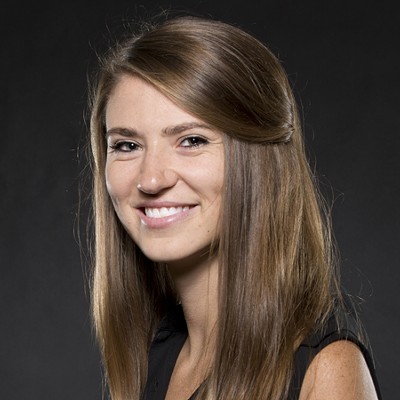On a Sunday morning about a year ago, Robert Lansburgh rode his bike across the MacArthur Causeway. The longtime cyclist was stunned by the view along the way — but also a bit shaken by the cars rushing past him.
"It's three lanes. It's not patrolled," he says. "You have cars that could be going 80 mph. It's out of control. It's great if you have a Ferrari and you want to get it in sixth gear."
The experience got him thinking: What if a lane of the causeway could occasionally be reserved for cyclists and pedestrians?
A year later, the Florida Department of Transportation is evaluating Lansburgh's idea, which would close the right lanes of the MacArthur and Julia Tuttle Causeways to motor vehicle traffic from 6 to 11 a.m. Saturdays and Sundays. Bicyclists, pedestrians, runners, and others would use the right lanes during those hours. He's created a Facebook group in support of the idea and now has nearly 400 likes.
"I think if you made it safer, you'd have a lot of people between downtown and Miami Beach using that road and really enjoying it," Lansburgh says.
Because Miami is a traffic hellscape most of the time, the concept might sound absurd. But Lansburgh, a real-estate investor who was a vocal critic of Miami Beach's stalled light-rail project, insists causeway traffic is light on weekend mornings. And cities across the nation, including San Jose and New York, are experimenting with closing roads to cars and turning them over to pedestrians during set timeframes.
In fact, Coral Gables commissioners are considering an ordinance that would allow the city manager to establish so-called play streets, where roadways would be shut down to vehicles and instead used for play. The ordinance passed unanimously on its first reading last month.
One of the closest parallels to Lansburgh's idea is Ciclovía, a weekly event in Bogotá, Colombia, that closes 76 miles of roads to cars. Los Angeles has tried something similar.
"It's one of the most exciting concepts now — taking back the roads," Lansburgh says. "We're not reinventing the wheel here."
FDOT officials are still looking into the idea. In an email to Lansburgh, James Wolfe, the secretary for the department's Miami district, shared his initial thoughts, writing that the department developed a concept for a bike lane that would pull traffic away from the road but that it would cost more than $10 million and there hasn't been much of a move to fund it. Reserving a lane for bicyclists seems unlikely, he added.
On the MacArthur Causeway, however, Wolfe wrote, some type of bicycle provision could tie into the Underline and a bike path beneath I-395. FDOT plans to get back to Lansburgh with an analysis of the concept within the next week.
[
{
"name": "Air - MediumRectangle - Inline Content - Mobile Display Size",
"component": "19274298",
"insertPoint": "2",
"requiredCountToDisplay": "2"
},{
"name": "Editor Picks",
"component": "17482312",
"insertPoint": "4",
"requiredCountToDisplay": "1"
},{
"name": "Inline Links",
"component": "18711090",
"insertPoint": "8th",
"startingPoint": 8,
"requiredCountToDisplay": "7",
"maxInsertions": 25
},{
"name": "Air - MediumRectangle - Combo - Inline Content",
"component": "17482310",
"insertPoint": "8th",
"startingPoint": 8,
"requiredCountToDisplay": "7",
"maxInsertions": 25
},{
"name": "Inline Links",
"component": "18711090",
"insertPoint": "8th",
"startingPoint": 12,
"requiredCountToDisplay": "11",
"maxInsertions": 25
},{
"name": "Air - Leaderboard Tower - Combo - Inline Content",
"component": "17482313",
"insertPoint": "8th",
"startingPoint": 12,
"requiredCountToDisplay": "11",
"maxInsertions": 25
}
]












